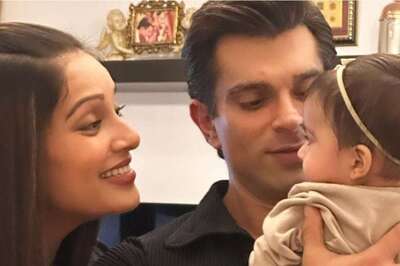
views
This man was Rajesh Balwani, and he was eventually cast as Ali, Shanu's older taxi driver friend who encourages him to sell the mobile phone left behind in his taxi and make a quick buck.
Most of the actors I auditioned had their eyes on characters other than the ones I was considering them for (in all fairness). The plum role was Shanu's and I wanted to cast him before even thinking about the others.
An actor called Vikas Kumar rose to the occasion. He's the friend of a friend, active in theatre and in film as a dramaturge and dialogue coach. He's of thin frame, sunken cheek and exudes sincerity. A Shanu by look, definitely.
My decision was made on the following basis: After hearing the narration, he lapsed into a long silence. It took him a while to say anything, and when he did, his comments were quite sparse and reserved. But when we did a little screen test (in an abandoned corridor of an industrial estate in Andheri), the character rose to his eyes. When I saw that understanding in his eyes, it was easy to take the decision.
Each professional who came on to the project brought with them the contacts of others who would be willing to do such work. Thus, the preparation progressed like a rapidly branching tree. Not to say that there weren't any problems. The untanglements of one day would knot themselves afresh a few days later.
Things were precarious because in these circumstances, my only contract with other parties was a handshake. Commitment and goodwill certainly held me in good stead, but they weren't entirely dependable: Once a very talented and sought-after actor agreed to be a part of the film, then backed out days before the shoot. The excitement of his agreeing came crashing down.
I did better when I started accepting these pitfalls. A previous experience really helped me along - A few months ago, I had been in Greece, helping my boss in making a one-minute tourism film for the Greek government. While we were there, Greece experienced its harshest extended winter in two decades. Just when I thought that our plans of making an inviting, summery tourism film were in serious jeopardy, my boss remained calm, and pushed ahead.
Somehow, through initiative, innovation and faith, we managed to squeeze out a good film from those very circumstances. I tried to evoke the same spirit for my own film.
In retrospect, when I think of the days before the shoot, I recall foremost a certain energy that I didn't know I possessed. My body seemed to have kicked in the reserves, and I think that it was enjoying surprising me. I think what happened was that psychologically and psychosomatically, all its stops were yanked out. My subconscious mind probably willed that to happen. I guess when you can will these things with your conscious mind, you must be close to enlightenment.
A few days before the shoot, we did some camera tests. I took Rakeshji (the owner of the taxi) and his cab to my cameraman's house in Bandra where we parked it in the driveway, flicked on the blue chandelier inside and determined what we could get from the equipment (or the lack of) we possessed.
Vikram, my cameraman, is an innovative auteur himself, at the doorstep of directing his first feature film, facing the arduous frustrations of getting his first work on the floor. We share a deep love for cinema, and I trust his eye completely. Vikas, who would play the lead, came along to get a feel for the vehicle he's be driving. When I looked through the viewfinder, I saw for the first time what this film could/would look like. It was quite exciting. I felt quite elated until Vikas told me that he had lost his driving licence.
Problems, big and small, swelled and ebbed steadily over the next few days. However, there was one ulcer-inducing problem that still rested like a cannonball at the pit of my stomach. The climactic sequence of Shanu Taxi took place at the international airport. I had long since given up trying to get permission to shoot there. Too much money and too much red tape lay between me and shooting the climax legit.
I was in a strange no man's land. Professional film production people convinced me that problems only arose when you carried heavy setup equipment for the shoot. It was best to be a gureilla. Well, at least we could be smart gureillas. We piled into Vikram's car and did a surreptitious recce of both the domestic and international airports. Surprisingly, during the recce, it was the international terminal that looked the most promising. We would leave it to the day of the shoot, and hope for the best in the name of Allah, Jesus and Prabhu.
The day of shoot arrived. The first thing I thought of when I crawled out of bed was that it would be over twenty four hours before I could get back to the same bed. That's the funny thing about this business. When there's no work, things are too still for comfort. When the work comes, it comes like in driving torrents; and then you yearn for stasis again. I had to go to work that morning. Guess where my mind was the whole day?
At five, Mr Zul Vellani arrived outside the office. He is close to eighty years old, asthmatic and can barely walk. Yet he has the spirit of a man a quarter his age. He has shared a stage with Balraj Sahni, and in one day and age, he used to breakfast with Nehru every few months. I had met him once on a previous assignment where I had assisted him in some dialogue dubbing.
When we travelled to the first location together, he asked me for Re 1. When I gave him a coin in his hand he said the following: "This is my salary. I am a professional and I must be paid. Remember this when you are fifty and someone young like yourself asks for your help." For the rest of the ride he told me about his conversations with Nehru and many other very interesting things.
I had chosen very contained environments to shoot in for the first night: a chawl room, a posh apartment and some relatively 'safe' roads. We cracked a coconut before the fist shot in the chawl. The whole group arrived on time. Kunal the sound recordist, Akshay the First Assistant Director, Ishika the stills photographer and of course, the actors. I remained aware of time's passage for a few shots, and then I didn't know where the time went.
I have often marvelled at the directors I have worked under. What keeps them going, night after night, maintaining that same level of concentration while I staggered to keep up with them? The answer lay brazenly in front of me - things are different when you are doing your own work, the type that lies close to your heart. The body somehow complies to this harmony and makes allowances by brushing aside inconsequentials like hunger and fatigue.
Akshay had once said to me that "film is sensitive to things other than light alone" - meaning that what gets recorded in the camera is more than just the shot. The atmosphere of the set penetrates it as well. I am happy to say that ours was a happy set. There was an ease, an alertness and a lightness to the group. It remained even when things got tense. If Akshay's right, then a lot of good stuff got absorbed into this film along with the shots taken.
(Vasant works as a creative assistant to a film director in Mumbai)
first published:April 27, 2006, 16:18 ISTlast updated:April 27, 2006, 16:18 IST
window._taboola = window._taboola || [];_taboola.push({mode: 'thumbnails-mid-article',container: 'taboola-mid-article-thumbnails',placement: 'Mid Article Thumbnails',target_type: 'mix'});
let eventFire = false;
window.addEventListener('scroll', () => {
if (window.taboolaInt && !eventFire) {
setTimeout(() => {
ga('send', 'event', 'Mid Article Thumbnails', 'PV');
ga('set', 'dimension22', "Taboola Yes");
}, 4000);
eventFire = true;
}
});
window._taboola = window._taboola || [];_taboola.push({mode: 'thumbnails-a', container: 'taboola-below-article-thumbnails', placement: 'Below Article Thumbnails', target_type: 'mix' });Latest News
Final Prep through ShootShanu Taxi was rolling ahead. I realised its momentum when an actor who I had never met before dropped by where I work to leave his photos, having heard that we were "making some short film about a taxi driver".
This man was Rajesh Balwani, and he was eventually cast as Ali, Shanu's older taxi driver friend who encourages him to sell the mobile phone left behind in his taxi and make a quick buck.
Most of the actors I auditioned had their eyes on characters other than the ones I was considering them for (in all fairness). The plum role was Shanu's and I wanted to cast him before even thinking about the others.
An actor called Vikas Kumar rose to the occasion. He's the friend of a friend, active in theatre and in film as a dramaturge and dialogue coach. He's of thin frame, sunken cheek and exudes sincerity. A Shanu by look, definitely.
My decision was made on the following basis: After hearing the narration, he lapsed into a long silence. It took him a while to say anything, and when he did, his comments were quite sparse and reserved. But when we did a little screen test (in an abandoned corridor of an industrial estate in Andheri), the character rose to his eyes. When I saw that understanding in his eyes, it was easy to take the decision.
Each professional who came on to the project brought with them the contacts of others who would be willing to do such work. Thus, the preparation progressed like a rapidly branching tree. Not to say that there weren't any problems. The untanglements of one day would knot themselves afresh a few days later.
Things were precarious because in these circumstances, my only contract with other parties was a handshake. Commitment and goodwill certainly held me in good stead, but they weren't entirely dependable: Once a very talented and sought-after actor agreed to be a part of the film, then backed out days before the shoot. The excitement of his agreeing came crashing down.
I did better when I started accepting these pitfalls. A previous experience really helped me along - A few months ago, I had been in Greece, helping my boss in making a one-minute tourism film for the Greek government. While we were there, Greece experienced its harshest extended winter in two decades. Just when I thought that our plans of making an inviting, summery tourism film were in serious jeopardy, my boss remained calm, and pushed ahead.
Somehow, through initiative, innovation and faith, we managed to squeeze out a good film from those very circumstances. I tried to evoke the same spirit for my own film.
In retrospect, when I think of the days before the shoot, I recall foremost a certain energy that I didn't know I possessed. My body seemed to have kicked in the reserves, and I think that it was enjoying surprising me. I think what happened was that psychologically and psychosomatically, all its stops were yanked out. My subconscious mind probably willed that to happen. I guess when you can will these things with your conscious mind, you must be close to enlightenment.
A few days before the shoot, we did some camera tests. I took Rakeshji (the owner of the taxi) and his cab to my cameraman's house in Bandra where we parked it in the driveway, flicked on the blue chandelier inside and determined what we could get from the equipment (or the lack of) we possessed.
Vikram, my cameraman, is an innovative auteur himself, at the doorstep of directing his first feature film, facing the arduous frustrations of getting his first work on the floor. We share a deep love for cinema, and I trust his eye completely. Vikas, who would play the lead, came along to get a feel for the vehicle he's be driving. When I looked through the viewfinder, I saw for the first time what this film could/would look like. It was quite exciting. I felt quite elated until Vikas told me that he had lost his driving licence.
Problems, big and small, swelled and ebbed steadily over the next few days. However, there was one ulcer-inducing problem that still rested like a cannonball at the pit of my stomach. The climactic sequence of Shanu Taxi took place at the international airport. I had long since given up trying to get permission to shoot there. Too much money and too much red tape lay between me and shooting the climax legit.
I was in a strange no man's land. Professional film production people convinced me that problems only arose when you carried heavy setup equipment for the shoot. It was best to be a gureilla. Well, at least we could be smart gureillas. We piled into Vikram's car and did a surreptitious recce of both the domestic and international airports. Surprisingly, during the recce, it was the international terminal that looked the most promising. We would leave it to the day of the shoot, and hope for the best in the name of Allah, Jesus and Prabhu.
The day of shoot arrived. The first thing I thought of when I crawled out of bed was that it would be over twenty four hours before I could get back to the same bed. That's the funny thing about this business. When there's no work, things are too still for comfort. When the work comes, it comes like in driving torrents; and then you yearn for stasis again. I had to go to work that morning. Guess where my mind was the whole day?
At five, Mr Zul Vellani arrived outside the office. He is close to eighty years old, asthmatic and can barely walk. Yet he has the spirit of a man a quarter his age. He has shared a stage with Balraj Sahni, and in one day and age, he used to breakfast with Nehru every few months. I had met him once on a previous assignment where I had assisted him in some dialogue dubbing.
When we travelled to the first location together, he asked me for Re 1. When I gave him a coin in his hand he said the following: "This is my salary. I am a professional and I must be paid. Remember this when you are fifty and someone young like yourself asks for your help." For the rest of the ride he told me about his conversations with Nehru and many other very interesting things.
I had chosen very contained environments to shoot in for the first night: a chawl room, a posh apartment and some relatively 'safe' roads. We cracked a coconut before the fist shot in the chawl. The whole group arrived on time. Kunal the sound recordist, Akshay the First Assistant Director, Ishika the stills photographer and of course, the actors. I remained aware of time's passage for a few shots, and then I didn't know where the time went.
I have often marvelled at the directors I have worked under. What keeps them going, night after night, maintaining that same level of concentration while I staggered to keep up with them? The answer lay brazenly in front of me - things are different when you are doing your own work, the type that lies close to your heart. The body somehow complies to this harmony and makes allowances by brushing aside inconsequentials like hunger and fatigue.
Akshay had once said to me that "film is sensitive to things other than light alone" - meaning that what gets recorded in the camera is more than just the shot. The atmosphere of the set penetrates it as well. I am happy to say that ours was a happy set. There was an ease, an alertness and a lightness to the group. It remained even when things got tense. If Akshay's right, then a lot of good stuff got absorbed into this film along with the shots taken.
(Vasant works as a creative assistant to a film director in Mumbai)




















Comments
0 comment